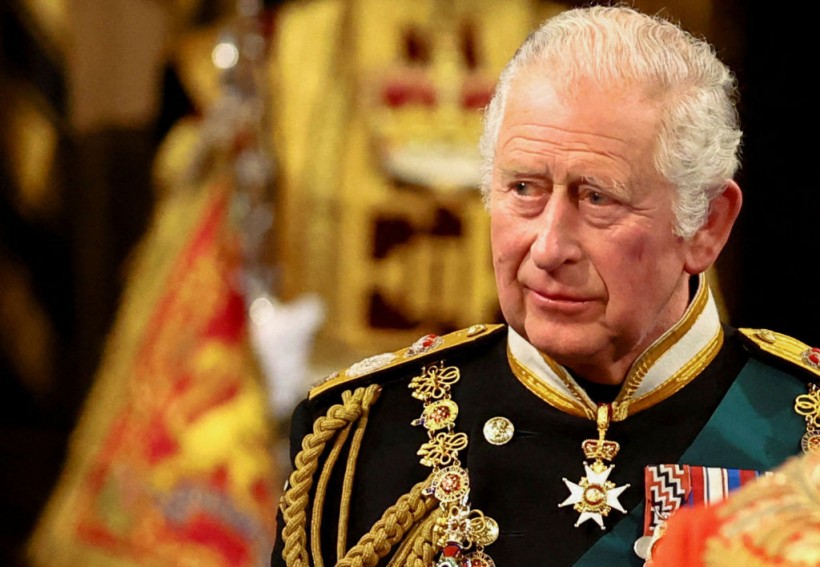
(Photo : HANNAH MCKAY/POOL/AFP via Getty Images)
Britain's Prince Charles, Prince of Wales proceeds through the Royal Gallery during the State Opening of Parliament at the Houses of Parliament, in London, on May 10, 2022. The 96-year-old monarch, who usually presides over the pomp-filled event and reads out her government's legislative programme from a gilded throne in the House of Lords, will skip the annual showpiece on her doctors' advice.
King Charles III, has come under scrutiny for its alleged exploitation of funds derived from the assets of deceased individuals in the north-west of England.
The estate, managed by the monarch's hereditary estate, has reportedly amassed tens of millions of pounds over the past decade through a system rooted in feudal times, as per The Guardian.
King Charles III Profiting From Dead Citizens' Money
Under the archaic mechanism bona vacantia, the duchy collects financial assets from individuals who died without a will or identifiable next of kin.
After covering expenses, the estate has long maintained that these funds are directed towards charitable endeavors, including the Duchy of Lancaster Jubilee Trust, established in 2001. This trust purportedly focuses on preserving heritage assets for the public benefit.
However, an investigation by The Guardian, based on internal duchy documents, has raised concerns about redirecting these funds toward renovating commercial properties within the estate's portfolio, which are then rented out for profit.
The 2020 policy, codenamed SA9, ostensibly allows the use of bona vacantia for the "public good" to repair and protect duchy properties categorized as "heritage assets."
The expansive definition of heritage assets, as outlined in the policy, includes listed buildings and those in conservation areas, areas of outstanding natural beauty (AONB), or those deemed of "local historical importance" or particular scientific interest.
Insiders familiar with the duchy's expenditure reportedly view the funds collected from bona vacantia as a "slush fund" and "free money." The sources confirmed that these revenues were being utilized to refurbish various properties, including townhouses, holiday rentals, rural cottages, an old petrol station, and even barns facilitating partridge shoots in Yorkshire.
Notably, the funds have been allocated to projects ranging from converting farm buildings into commercial offices to purchasing log burners for properties owned by the king and managed by his estate. This practice aims to enhance the profitability of rental properties, indirectly benefiting the king, who received a £26 million annual payout from the duchy in his first year as monarch.
The 2020 policy acknowledges the potential for an "incidental" benefit to the king's private income resulting from this expenditure. It states that while the primary intention is to preserve and protect property fabric, any use of the privy purse (the king's private income) is secondary, according to Mail Online.
Read Also: Hamas Delays Hostage Swap With Israel-Reason Unknown
King Charles III Faces Bona Vacantia Funds Allegations
In response to the allegations, a spokesperson for the Duchy of Lancaster emphasized that the bona vacantia funds are allocated among three charities established by the late Queen, including the Duchy of Lancaster Benevolent Fund, the Duke of Lancaster Housing Trust, and Jubilee Trust.
The spokesperson maintained that these charities were created to ensure bona vacantia income no longer benefits the Privy Purse.
Upon ascending to the throne, the spokesperson reiterated that King Charles III reaffirmed that funds from bona vacantia should primarily support local communities, preserve land sustainability and biodiversity, and safeguard public and historic properties across the Duchy of Lancaster estates. This includes restoration and repair projects to protect these structures for future generations.
Despite these assertions, The Guardian's analysis raises questions about the transparency and ultimate purpose of the funds, especially considering the reported use for renovations that contribute to the profitability of rental properties and, by extension, the king's income.
Meanwhile, it's important to note that King Charles III inherited the Duchy of Lancaster from his mother, Queen Elizabeth II, who passed away on September 8, 2022.
Although the royal couple owns multiple homes in Great Britain, they have primarily resided in Clarence House for nearly two decades. Plans to move to Buckingham Palace are reportedly in progress and contingent on the completion of renovations, Sky News reported.
Related Article: Warming Up? Harry and Meghan Call King Charles on UK Monarch's 75th Birthday









